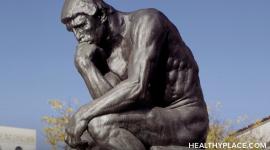What are the Cognitive Symptoms (Deficits) in Depression?
The cognitive symptoms (deficits) in depression can be debilitating. Many people with depression find that not only are their physical and psychological experiences changed because of depression, but so is the way that they think (cognition). The negative effects of depression on thinking are known as cognitive dysfunctions and are common. In fact, one such cognitive symptom of depression, the diminished ability to think or concentrate; indecisiveness, is noted in the Diagnostic and Statistical Manual of Mental Disorders (DSM-5), the book that defines how mental illnesses are diagnosed. (Take cognitive symptoms (deficits) depression test to measure your level of severity. Instantly scored.)
There are more than just the cognitive problems with depression that are listed in the DSM-5, however. There are five main areas where people experience the cognitive symptoms of depression:
- Memory
- Concentration
- Physical and psychological actions (psychomotor skills)
- Speed of thought (reduced brain processing speed)
- Decision-making

Cognitive Symptom of Depression: Memory Loss
Depression and the cognitive symptom of memory loss is well established. Remembering verbal information may be particularly difficult. More severe depressions and psychosis tend to result in greater memory impairment and the elderly tend to have particularly impaired memories.
It has been shown that not only do people who are actively depressed suffer from the cognitive problem of memory loss, but some memory loss (to a lesser degree) is even present when people are in remission.
Cognitive Symptom of Depression: Problems Concentrating
Often, people with major depressive disorder find it hard to concentrate, or pay attention, when others are speaking or during a sustained task such as reading. Problems with concentration may be particularly apparent when many things are happening at once. In that situation, a person with depression may not be able to concentrate on anything or they may focus on one thing to the exclusion of all others. This can drastically impact one's ability to multitask.
Perhaps most unfortunately, while people with depression experience trouble concentrating on the world around them, they often have no trouble concentrating on the negative thoughts caused by depression. One theory is that because so much effort is spent processing these negative thoughts, there is less energy available to deal with other types of thoughts.
Cognitive Symptom of Depression: Psychomotor Skills
Psychomotor skills are those skills that require thought and action together. Psychomotor agitation or retardation in depression are specifically mentioned in the DSM-5. In psychomotor agitation, the person with depression feels a sense of inner restlessness and this often presents itself in a purposeless, repetitive, physical gesture such as hand-wringing. In psychomotor retardation, the opposite is true. Movements may become slow or difficult to produce. Psychomotor skill impairment may also present itself as a lack of coordination.
Cognitive Symptom of Depression: Speed of Thought
People with depression often experience the cognitive problem of reduced brain processing speed (depression and slow thinking). Some people may refer to this, combined with other cognitive symptoms, as "brain fog." For example, problem-solving may take a long time for someone with depression while they think through all the choices.
Cognitive Symptom of Depression: Indecisiveness
People with major depression also often feel the cognitive symptom of indecisiveness. Decision-making is often more of a problem when making emotional decisions rather than intellectual ones. Decision-making is often delayed or even avoided altogether in people with depression.
Handling the Cognitive Problems with Depression
While all that may seem overwhelming, remember that there are ways of handling the cognitive problems with depression. See the article: Treating Cognitive Deficits in Depression for more information.
APA Reference
Tracy, N.
(2021, December 30). What are the Cognitive Symptoms (Deficits) in Depression?, HealthyPlace. Retrieved
on 2026, January 9 from https://www.healthyplace.com/depression/symptoms/what-are-the-cognitive-symptoms-deficits-in-depression



